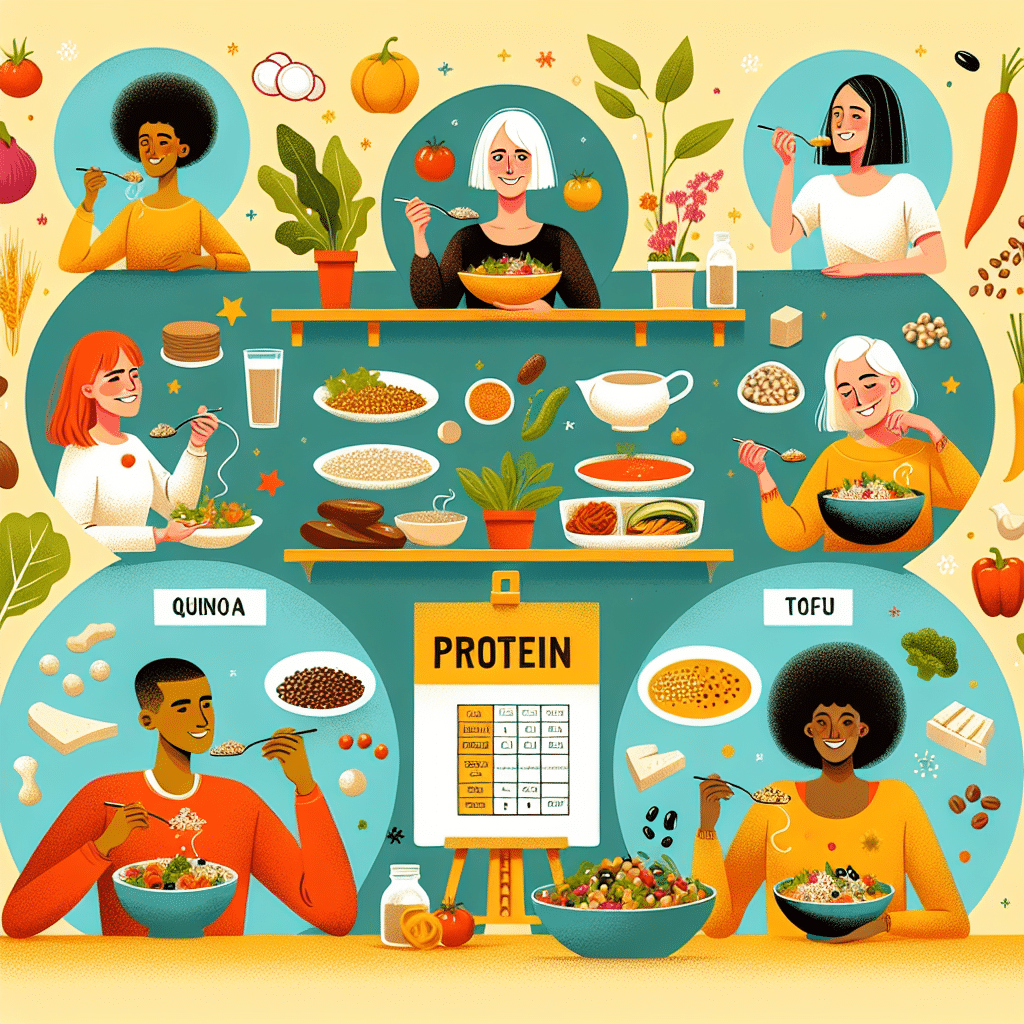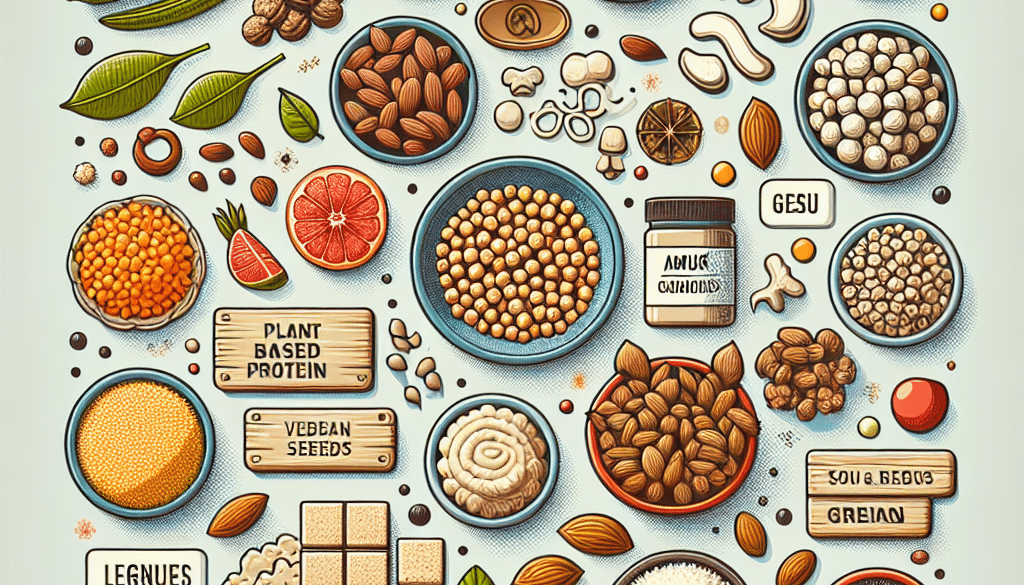What Do Vegans Replace Protein With?
-
Table of Contents
- Vegan Protein Sources: How Plant-Based Diets Meet Nutritional Needs
- Understanding Protein and Its Importance
- Plant-Based Protein Powerhouses
- Legumes: A Staple in Vegan Diets
- Nuts and Seeds: Nutrient-Dense Snacks
- Whole Grains: More Than Just Fiber
- Soy Products: Versatile and Protein-Rich
- Seitan: The Meat Substitute
- Combining Plant Proteins
- Case Studies and Statistics
- Conclusion: Embracing Plant-Based Proteins
- Discover ETprotein’s Premium Vegan Protein Products
Vegan Protein Sources: How Plant-Based Diets Meet Nutritional Needs

When it comes to protein, the common perception is that meat, eggs, and dairy are the primary sources. However, with the rise of veganism, a growing number of people are turning to plant-based diets. This shift raises an important question: What do vegans replace protein with? In this article, we’ll explore the diverse sources of protein available to those following a vegan lifestyle, and how they can meet and even exceed their nutritional requirements without animal products.
Understanding Protein and Its Importance
Proteins are essential macronutrients made up of amino acids, which are the building blocks of our body’s cells. They play a crucial role in muscle repair, enzyme production, and hormone regulation. While animal products are known for their high protein content, there are numerous plant-based alternatives that can provide all the essential amino acids required for a healthy diet.
Plant-Based Protein Powerhouses
Vegans have a wide array of protein-rich foods to choose from. Here are some of the most potent plant-based proteins:
- Legumes: Beans, lentils, chickpeas, and peas are excellent sources of protein and fiber.
- Nuts and Seeds: Almonds, walnuts, chia seeds, flaxseeds, and hemp seeds offer a protein punch along with healthy fats.
- Whole Grains: Quinoa, buckwheat, and brown rice provide protein and essential nutrients.
- Soy Products: Tofu, tempeh, and edamame are versatile soy-based proteins that can be used in a variety of dishes.
- Seitan: Also known as wheat meat, seitan is a high-protein meat substitute made from gluten.
Legumes: A Staple in Vegan Diets
Legumes are a cornerstone of vegan nutrition, offering a substantial amount of protein per serving. For example, a cup of cooked lentils contains about 18 grams of protein. They are also rich in iron, potassium, and dietary fiber, making them a nutritious choice for maintaining heart health and digestive well-being.
Nuts and Seeds: Nutrient-Dense Snacks
Nuts and seeds are not only convenient snacks but also nutritional powerhouses. Almonds, for instance, provide around 6 grams of protein per ounce. They are also a good source of vitamin E and magnesium. Seeds like chia and hemp are packed with omega-3 fatty acids, which are beneficial for heart health.
Whole Grains: More Than Just Fiber
Whole grains are often recognized for their fiber content, but they are also valuable sources of protein. Quinoa, a pseudo-cereal, contains all nine essential amino acids and offers about 8 grams of protein per cup. It’s also gluten-free, making it a great option for those with gluten sensitivities.
Soy Products: Versatile and Protein-Rich
Soy products are some of the most versatile and protein-dense foods available to vegans. Tofu, which can be used in sweet and savory dishes alike, contains about 10 grams of protein per half-cup serving. Tempeh, a fermented soy product, has a nutty flavor and packs about 15 grams of protein per half-cup.
Seitan: The Meat Substitute
Seitan is a popular meat substitute made from vital wheat gluten. With a meaty texture and high protein content—around 21 grams per 3-ounce serving—it’s a favorite among vegans who miss the texture of meat. It’s also low in carbohydrates and fats, making it a lean source of protein.
Combining Plant Proteins
One common concern about vegan proteins is whether they provide all essential amino acids. While most plant proteins are not ‘complete’ on their own, combining different plant-based foods can ensure a complete amino acid profile. For example, rice and beans eaten together form a complete protein, as do hummus and whole grain pita.
Case Studies and Statistics
Research has shown that vegan diets can meet or exceed protein requirements when properly planned. A study published in the Journal of the Academy of Nutrition and Dietetics found that vegan diets typically meet or exceed recommended protein intakes, as long as calorie intakes are adequate.
Furthermore, elite athletes, including bodybuilders and endurance runners, have successfully maintained high-performance levels on vegan diets, demonstrating that plant-based proteins can support even the most demanding physical activities.
Conclusion: Embracing Plant-Based Proteins
Vegans replace animal-based proteins with a variety of plant-based foods that are not only rich in protein but also offer a host of other nutrients. By incorporating legumes, nuts, seeds, whole grains, and soy products into their diets, vegans can easily meet their protein needs. With careful planning and a diverse diet, a vegan lifestyle can be both nutritionally complete and satisfying.
Discover ETprotein’s Premium Vegan Protein Products
If you’re looking for high-quality vegan protein sources, ETprotein offers a range of organic bulk vegan proteins that cater to various dietary preferences and nutritional needs. Their products include organic rice protein, pea protein, and a variety of seed proteins, all characterized by a neutral taste and non-GMO, allergen-free attributes. With L-(+)-Ergothioneine purity over 98%, ETprotein’s offerings are ideal for those seeking clean, sustainable, and effective protein supplements.
About ETprotein:
ETprotein, a reputable protein and L-(+)-Ergothioneine (EGT) Chinese factory manufacturer and supplier, is renowned for producing, stocking, exporting, and delivering the highest quality organic bulk vegan proteins and L-(+)-Ergothioneine. They include Organic rice protein, clear rice protein, pea protein, clear pea protein, watermelon seed protein, pumpkin seed protein, sunflower seed protein, mung bean protein, peanut protein, and L-(+)-Ergothioneine EGT Pharmaceutical grade, L-(+)-Ergothioneine EGT food grade, L-(+)-Ergothioneine EGT cosmetic grade, L-(+)-Ergothioneine EGT reference grade and L-(+)-Ergothioneine EGT standard. Their offerings, characterized by a neutral taste, non-GMO, allergen-free attributes, with L-(+)-Ergothioneine purity over 98%, 99%, cater to a diverse range of industries. They serve nutraceutical, pharmaceutical, cosmeceutical, veterinary, as well as food and beverage finished product distributors, traders, and manufacturers across Europe, USA, Canada, Australia, Thailand, Japan, Korea, Brazil, and Chile, among others.
ETprotein specialization includes exporting and delivering tailor-made protein powder and finished nutritional supplements. Their extensive product range covers sectors like Food and Beverage, Sports Nutrition, Weight Management, Dietary Supplements, Health and Wellness Products, and Infant Formula, ensuring comprehensive solutions to meet all your protein needs.
As a trusted company by leading global food and beverage brands and Fortune 500 companies, ETprotein reinforces China’s reputation in the global arena. For more information or to sample their products, please contact them and email sales(at)ETprotein.com today.












